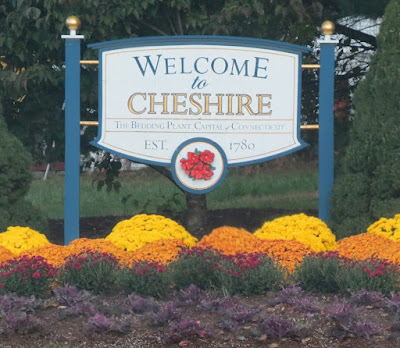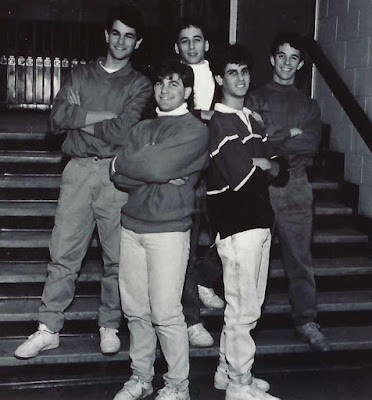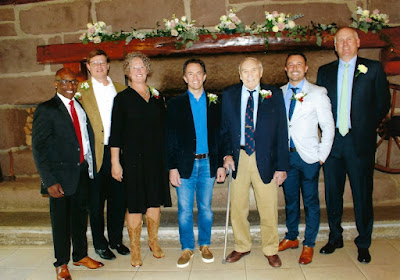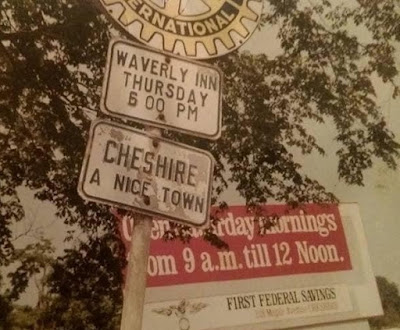Anne Collins Ludwick (then Anne Collins) was not the first female to write scripts for The New Adventures of Wonder Woman. She was the last. To clarify, she wrote the last five episodes (among others).
That’s throwing down the gauntlet to me.
Luckily Anne did not throw up her bracelets to deflect me. She kindly agreed to an interview and I excitedly share it here:
How did you end up writing for Wonder Woman?
Somewhere in the process of writing three scripts for Hawaii Five-O in the mid-70s, the show’s Story Editor, Curtis Kenyon, helped me get an agent, John Schallert. Though I was working at a PR firm and living in Denver at the time, John successfully pitched me to the people at Wonder Woman, who were looking for a woman to join its writing staff. So I packed up my VW Rabbit, sublet my apartment, and drove out to LA, fully expecting to return within a month once they discovered how inexperienced and untalented I was.
But to my surprise, I discovered I could, in fact, hold my own when it came to working with and, frequently, heavily editing the work of the (mostly male) freelance writers to whom the show was giving assignments. The Supervising Producer, Bruce Lansbury, was such a joy to work with and so creative and sooo supportive that I stayed in LA for the next seven years and never looked back.
Did you pitch storylines on your own or as part of a team, or were writers assigned certain premises by producers?
Bruce, the studio and the network had a vision for the show, which in its second season saw it move from WWII into the ‘70s, so there was already an informal list of suggested and approved storylines. At that time TV programs were required to utilize freelance writers. We would contact writers we thought would “get” the show and assign a story area to them, though they were also free to pitch their own ideas if they wanted. I, too, could and did pitch ideas, of course, but as story editor I mostly helped outside writers develop their stories and would rewrite/polish their final drafts if/when necessary.
Tell me more about the informal list.
The “list” was a compilation of thoughts and ideas that were tossed around in meetings Bruce Lansbury had with various studio, network, and production company heads as the season progressed. Bruce, in turn, discussed these storylines or, quite often, mere arenas for storylines, in subsequent meetings with me in hopes of determining what writer might be particularly well-suited to tackle which arena. So any “list” I ever had consisted of hastily scrawled, long gone notes. This was waaayyy before index cards on bulletin boards.
It looks like you first wrote for the show during season 2 (of a three-season series). Were you already a fan of the show (or the character)?
I never saw a single episode of Wonder Woman before I joined the show. However, my two brothers and I were avid consumers of DC comics growing up so I was familiar with the character, although I must admit, she was not my fave because, unlike Superman, Superboy, or Surpergirl, she couldn’t fly. (Never was a fan of that invisible plane.)
Is there one story about your Wonder Woman days that you tell more than any other?
My hands doubled for Lynda Carter’s in the episode called (I think) “The Man Who Made Volcanoes.”
Oh, and also, I was walking across the lot (Warner Bros. in Burbank) one day for some reason with the show’s producer, Charlie FitzSimons (wonderful Irish guy, Maureen O’Hara’s brother). As he talked I became aware of a guy walking toward us, someone with the most electrically blue eyes I had ever seen in my life. I couldn’t take my eyes off his, and suddenly had no idea, and could not care less about, what Charlie was saying to me. I recognized the guy’s face, but it was his eyes I’ll never forget. Paul Newman, in the flesh.
Any other funny/inspiring/weird anecdotes about your Wonder Woman experience?
There was one Saturday or Sunday early on in my Wonder Woman stint that I absolutely had to get into my office to write/rewrite something (this was eons before laptops, remember). However, to my horror, the key I was given to the WW office suite would not work. Desperate to get to my typewriter, and more than a little pissed at the key, I took the door handle with both hands and shook it in utter frustration. Causing the lock to break and the door to limp open. I went straight to my office and got to work.
Next thing I know, a wide-eyed security guard was peering at me from around the corner of my doorway, hand on his nightstick, ready to use it on whomever had broken into the suite. I apologized for breaking the door but it was an emergency. I just kept working, and he finally went away to get the door fixed. He also filed a report, so that come Monday everyone knew the story and thought it was quite amusing, and appropriate, that a woman employed by Wonder Woman had busted down a door.
What was it like to be a female writer in Hollywood in the 1970s? How did the men involved with the show treat you?
Frankly, so grateful was I to be getting paid for something I absolutely loved to do that I never gave my gender much thought. I never came close to being pressured into sleeping with someone in order to get work, and I never felt like I was being patronized, or that my work was in any way discounted because I was female. When dealing with some of the older male freelancers (and there were quite a few back then that had written for network TV since its inception), I occasionally detected some arrogance and resistance to my notes on their scripts, but I don’t recall any major incidents. I felt like the producers on the show respected me because I could, and did, get the job done promptly and well.
At the time, did you reflect on the number of women vs. number of men writing for the show?
No, because at that time, there were very few women writing action-adventure, and there was also nowhere near the pressure to hire women and minorities back then that there is now. True, I was hired by WW largely because everyone, including Lynda, felt the show could only benefit from including “a woman’s POV,” but I’m not sure my gender ever really had a big influence on the scripts we churned out.
Do you remember any instances where you felt strongly about an idea that didn’t make it on air?
No. Hey, I well understood the perimeters of what we were creating: WW aired at 8 pm on Friday and was considered “family” programming. Which meant no realistic violence, no swearing, no drinking, no depiction of deviant behavior, no adult situations. The network’s Standards and Practices Department scoured every script and finished episode to make sure nothing that could be construed in any way as offensive made it on the air.
Did you interact with Lynda Carter, and if so, what was your impression of her? Did it change over time in any way?
Lynda was a sweetheart. We didn’t hang out, but our interactions were always pleasant and she always came across as genuine. She wasn’t hired because of her acting skills, and she no doubt knew that, which had to’ve made showing up for work every day somewhat terrifying. But by golly she did her best, and I have to say, whenever I happen to catch an episode, I’m struck with how likeable she comes across on screen. Not just because of her considerable physical beauty, but she has a nice, watchable presence. Probably because she is/was basically a sincerely nice person.
What is your favorite episode that you wrote and why?
“Phantom of the Roller Coaster,” probably because it was such a colorful arena (who doesn’t love amusement parks?) and I have an affinity for Raggedy Man-type stories. It started out as a single episode, but the shoot at Magic Mountain went so well that we made a two-parter out of it, though I forget when in the process that decision was made, or exactly how much more shooting was involved.
What did you do professionally after Wonder Woman?
After WW was cancelled, Bruce Lansbury became the Supervising Producer on Buck Rogers. To repeat, Bruce was one of the kindest, merriest, most creative people I’ve ever known, so when he asked me to come aboard as Story Consultant, I immediately said yes. I was on staff on a couple of other shows after that, and eventually wound up story editing for Matlock while raising two kids in Seattle. I have two fantastic grown-up daughters.
What are you doing these days?
Living in the PNW, enjoying my WGA pension, and writing, though I’m not sure yet exactly what.
Anne 2022
Are either of your children fans of Wonder Woman?
I don’t think either of them have seen an episode of TV’s Wonder Woman, nor to my knowledge have they read a WW comic book. They both saw and liked the first Wonder Woman movie but passed on the second one (as did I).
Have you participated in any Wonder Woman-related event (comic convention, panel, documentary, etc.)? If not, would you be open to meeting fans and signing autographs?
No thanks. That kinda stuff just isn’t my thing.
Are you still in touch with anyone from the cast or crew?
No. Although I am still in touch with novelist Alan Brennert, the most talented freelancer to ever write for Wonder Woman.
When was the last time you watched Wonder Woman? How did you think it held up?
The last time I caught an episode was probably two years ago. As I said, Lynda was very watchable, but oh my gosh, the production was so amateurish compared to what’s on TV now. The special effects were dreadful, the storyline was simplistic, the dialog was utilitarian, and the characters were one-dimensional. But that was the way episodic TV was back then. The networks had a very low opinion of their audience; we writers were instructed to repeat info important to the plot as often as possible, and to spell things out for viewers instead of relying on them to figure things out. Pretty much the opposite of the way TV is now.
Do you have any mementos from the experience such as set photos, a script, or anything from the set?
I think I have copies of all the scripts I wrote for the show in a trunk somewhere, but that’s about it.
What did you think of the first Wonder Woman movie?
I loved it. It struck just the right tone and it worked. There was one scene—I think Wonder Woman making her way through a battlefield—that was incredibly moving. I didn’t bother to see the second movie after reading the reviews.
What did you think when you first heard my request?
I thought, who the hell would be interested in hearing about my experience on a short-lived TV show that ended more than 40 years ago?
How do you look back on your Wonder Woman experience?
I loved every single minute of it. Needless to say, as a kid originally from Toledo, Ohio, I’d never been on a real movie set before (though I did participate in some student productions during my two years of grad school at UT Austin). It felt good to be part of a major creative endeavor and to have my work appreciated (and well-compensated, though little did they know I would’ve gladly done all that writing for free!).
If the experience changed your life in any way, how?
Though I don’t remember the exact circumstance, I do remember Bruce Lansbury, in response to some expression of self-doubt I’d just made, sternly admonishing me, “You are a writer.” Not sure if he changed my life at that moment, but he definitely defined it.
Anything you’d like to add?
I’ve bored you enough.
Anne, no you didn’t. If you don’t believe me, put the magic lasso around me…
.jpg)

.jpg)
.jpg)

.jpg)
.jpg)
.jpg)

.jpg)

%20(800x600).jpg)
%20(800x601).jpg)

%20(800x602).jpg)
.jpg)